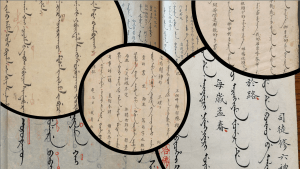We cordially invite you to join us on Wednesday, April 17, for the second VMPEA workshop of the quarter, taking place at our usual time at 4:45-6:45pm CT, CWAC 152. This workshop will feature:
Elvin Meng
PhD Candidate, Comparative Literature & EALC, UChicago
Discussant: Peter Kornicki
Emeritus Professor of Japanese Studies, University of Cambridge
Visiting Professor, UChicago
Who will be presenting the paper titled:
“Fragments into Voice into Fragments:
Manuscript Culture and the Nineteenth-Century Manchu Curriculum”
This event will take place in-person. For participants who would like to join via Zoom, please register here. Please see the abstract and bios for this workshop below.
We hope to see many of you in CWAC 152!

Abstract
Drawing on a genre of Sino-Manchu manuscripts I frequently encounter in archival research, this presentation gives a preliminary sketch of the entanglements between materiality (the production, circulation, and consumption of print and manuscript texts), sociality (which can be pedagogical, bureaucratic, commercial, familial), and semiotics (translatability, orality, authenticity) in nineteenth-century Sino-Manchu language pedagogical practice. Although I will give my tentative reconstruction of the typical Manchu language curriculum in private bannered schools in late-Qing Beijing, the focus of my presentation will be on a single genre of students’ materials—collections of short, vernacular dialogues known in Manchu as meyen and in Vernacular Sinitic as huatiaozi 話條子—that young children copied, read aloud, and memorized from day to day in these schools. Certain collections of meyen were put to print throughout the Qing period, but the genre primarily circulated in the form of manuscripts, as they were constantly modified, exchanged, or written anew in classrooms, familial or friend circles, or the book market.
The proliferation of meyen in nineteenth-century Beijing manuscript culture, then, requires an analysis across multiple levels—material, textual, social, institutional, conceptual, etc.—that present challenges. The complication is increased by the fact that little is recorded of the historical use of meyen texts except on/as the extant meyen artifacts themselves. As I am in the early stages of thinking through this genre of manuscripts, this talk will focus on some basic but important questions: What are their typical material features? What was their place in Manchu language education, which was in effect an education in Sino-Manchu translation? What did their readers do with them? What can be known about their production and circulation? In asking these questions, I will be led to also investigate the place of meyen in the conceptual-material ecology of Manchu writing at large, as the meyen genre played an important role in the Qing politicization of the texture, voicing, and history of language itself.
Bio
Elvin Meng is a doctoral candidate in Comparative Literature and East Asian Languages and Civilizations at the University of Chicago. His research interests include intellectual history, media theory, translation studies, and early modern Northeast Asia.
Peter Kornicki is emeritus professor of Japanese Studies at the University of Cambridge and currently a visiting professor at the University of Chicago. He is the author of Languages, Scripts and Chinese Texts in East Asia (2018), Eavesdropping on the Emperor: Interrogators and Codebreakers in Britain’s War with Japan (2021) and many other works.